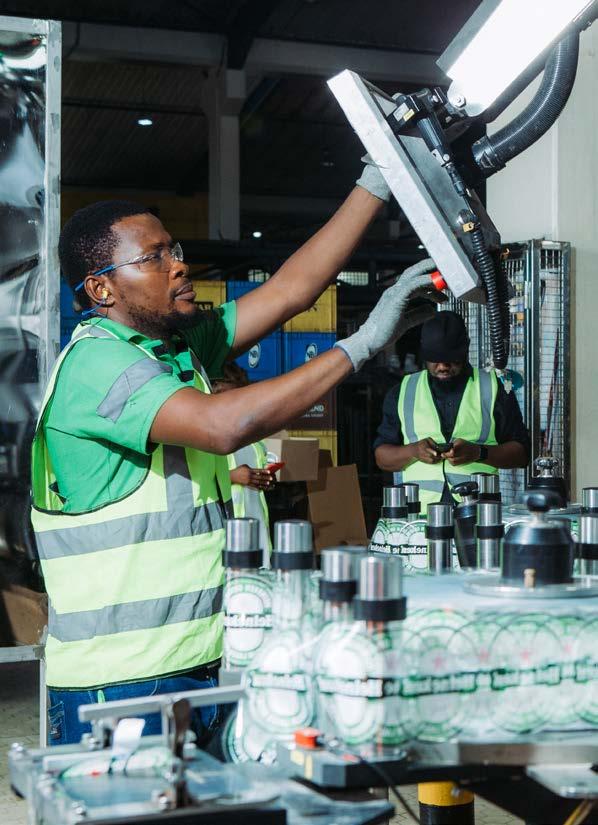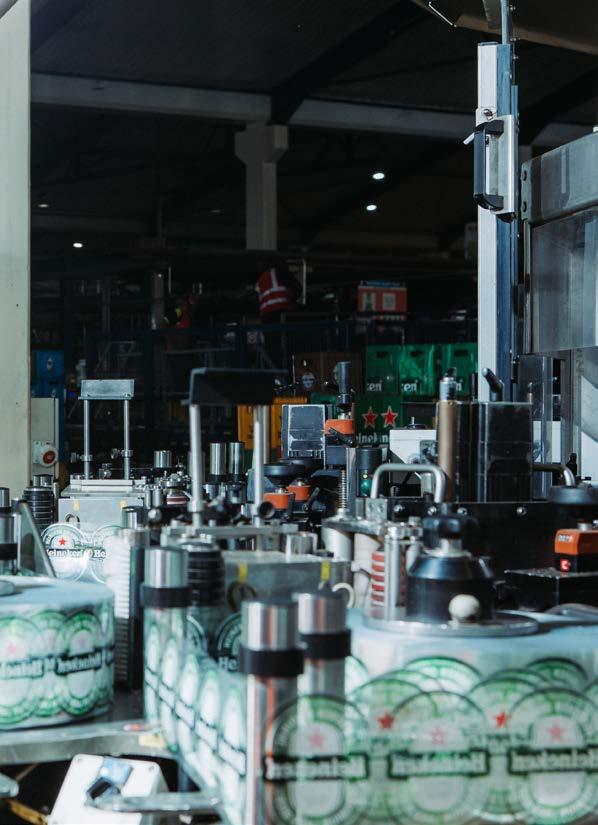
4 minute read
HEINEKENlocalising and leveraging procurement
HEINEKEN’s global procurement function is held up by many as blueprint for how a procurement function should look and feel in a multinational. The key to their continued success seems to lay in the synergy between their people, processes, and HEINEKEN’s global ethos.
Niels de Gooijer has been at HEINEKEN for more than a decade. An analytical leader who has influenced numerous successful programs, it can be said that he seeks the best in himself and everyone around him on a never ending continuous improvement journey. Presently as Regional Procurement Manager for the AMEE region Niels opens up on the dynamics of his function and why more international businesses should invest in the region.
Advertisement
Hi Niels, what is the scope of your role?
Securing supply against competitive pricing and in line with HEINEKEN’s sustainability ambitions is a joint responsibility of global category teams and local procurement teams. In the Africa Middle East and Eastern Europe (AMEE) I am responsible for local procurement teams in 11 out of 15 markets where we produce beer and other beverages. Roughly 50-60% of the spend is sourced by the global teams and the remainder is owned by the local teams.
As regional procurement representative I am also involved in HEINEKEN’s business development in the AMEE region, including our latest acquisition in Southern Africa; Distell.
Your responsibility covers a dynamic region, with many cultural, political, and geographical challenges. In many markets HEINEKEN is also not a main player. This I assume does not open itself to mirrored operations? What does the structure and reporting process look like in your team?
Procurement in HEINEKEN has its global procurement team based in Amsterdam. Here global category teams define global category strategies that cascade to local markets for them to localise and help deliver. Cross OpCo sourcing opportunities are also driven by the global teams. Alongside the categories there are regional teams that functionally manage the OpCo procurement functions. Then there are teams that run commodity risk management and enable future capabilities for the procurement function.
All AMEE teams are headed by a procurement manager, with a team of varying size reporting into them. As their dotted line manager, I work with the procurement managers and their finance directors (solid line manager) to deliver the OpCo and AMEE region objectives. We do so by leveraging and localising the global category strategies and further development of local capabilities to increase functional productivity.
There are many challenges in your territory. What would you point to as the main challenges and how many of these are addressable from a HEINEKEN perspective?
Our production and sales operations in these markets vary in size and number. All these markets are highly volatile, with challenges like steep inflation, hard currency shortage, continuous changes to legislation and in some markets cultural opposition against alcohol.
Conscious development of a more domestic and regional supplier base ensures multiple supply options and reduces the need for foreign currency. This also reduces our dependency on sea-freight, resulting in supply chains with increased agility and less stock in transit. As an additional side effect this reduces and even eliminates complexities involved when transporting across borders. More sophisticated and complex ways of mitigation involve unbundling and upstream sourcing of input materials to enable local supply. This allows HEINEKEN scale to be used on sourcing of these materials as well as the inbound logistics, and then benefit from local conversion.
A great opportunity of doing business in these markets is the local people. In many countries it is only possible for few to attend higher quality education, whereas the majority of the population is less fortunate. By investing in our people, educating them on the job on professional procurement practices they often are in a strong position when working with domestic suppliers.
HEINEKEN prides itself on adding value to the communities in which it operates. A big passion for yourself and responsibility within your role revolves around empowerment. How important to you is it that as an individual and business, you not only empower and upskill your team, but also open opportunities to the wider supplier community?
I am indeed a strong believer in setting up people to use their talent and skills where it adds value and use technology, automation, and standardisation where this frees up human capacity. I use this philosophy in an attempt to elevate the capabilities of local procurement functions. This firstly benefits our business, but people that acquire skills and knowledge can take these home to educate and provide for their spouse, family, and friends. Should they at some point choose to move beyond HEINEKEN they will help other companies thrive with their unique profile with experiences gained in our global company. It does however fill me with great pride that I have supported a number of our AMEE procurement talents who have moved into positions in European OpCos and our Head office.
By working with domestic vendors or those in surrounding countries we develop them to mature their service proposition. This benefits them in more efficiency, more sustainable ways of working and the building of capabilities with their employees. Not only we as HEINEKEN benefit from this but also other customers. Personally, I’d like to see traditional industries that currently supply us from outside Africa make an effort to expand their footprint into Africa.


So your role as Regional Head of Procurement is not just about getting the best price today, it is also about empowering the right supplier for tomorrow. Often a lack of skills within the markets you operate can force your hand into looking further afield. What opportunities exist for local suppliers and how do you support supplier growth?
With our aim to mature our procurement operations, it has to be an integral part of our agenda to do the same with our supplier base. If we continue to rely on importing materials our markets remain exposed to a multitude of supply chain risks. By continuously assessing the materials and services we import, we identify opportunities we can unlock by offering HEINEKEN capabilities to suppliers. A recent example is the development of a glue supplier in one of our markets. We used to import this from European suppliers as a finished product. By supporting a local production company with one of our quality experts we enabled the vendor to blend glue with all the right characteristics for our products.
As HEINEKEN holds safety as priority number one, we require any service provider to meet our quality standards and certification criteria. In one of our markets only one welding company was certified, who happened to be owned by a European. Procurement then worked with





